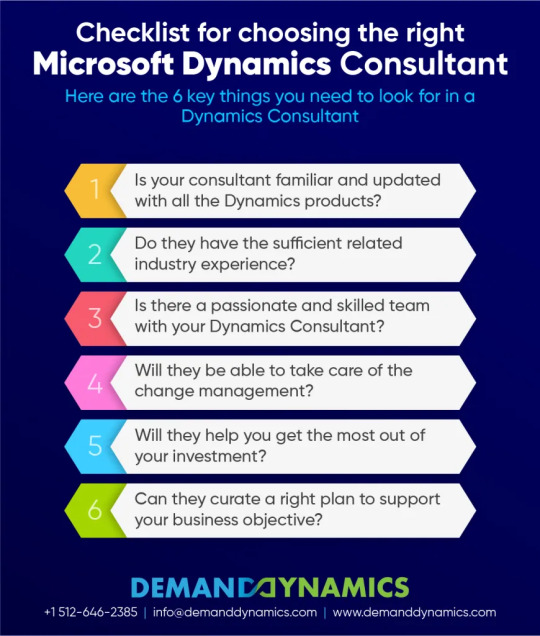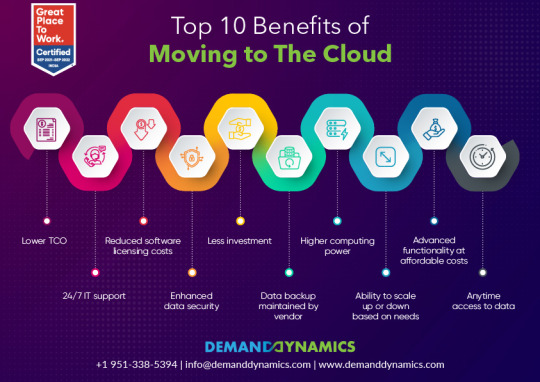Text
Challenges to Expect in Field Services and How Dynamics 365 Helps

The focus of businesses today is to keep customers satisfied and remain aligned with their changing requirements—for which customer-centric strategies are key. Field services are a leading business sector that deals with versatile logistics, resource management, and inventory maintenance. Common challenges they face are service delays, miscommunication, inadequate resources and staffing, and haphazard logistics management. To alleviate this, companies need a robust solution to manage work orders and field personnel, balance workloads, track inventory, and ensure timely service delivery to the client’s locations.
Top Five Challenges faced by Field Service businesses
1) Disparate scheduling Timely services and product delivery are the critical factors involved in customer loyalty. Conversely, haphazard scheduling processes can lead to delayed services and customer dissatisfaction.
2) Expensive Field service firms handle processes that often need re-work. For example, field service professionals might need to visit the customer’s site several times. Planning a revisit, carrying out appropriate tools based on the service request, and allocating staffing can be challenging and costly.
3) Communication gaps Transparency in services is a critical factor that customers look for in a field service organization. Therefore, it is better to have processes that enhance visibility and constant communication to inform your clients about possible service delays, rescheduling, or order cancellations.
4) Poor management Organizations rely on accurate and precise data to track their performance and access key business metrics such as ROI, market trends, customer behavior, sales performance, and internal resource management. As a result, companies cannot thrive in the competitive business world without an efficient management system.
5) Not future-ready Sometimes, companies do not anticipate possible technological shifts as they lack insights into proactive service management systems and modern-day technologies such as Artificial Intelligence (AI) and the Internet of Things (IoT). Microsoft offers multiple features and capabilities of Dynamics 365 Field Service to tackle these challenges and streamline field service operations.
Dynamics 365 for Field Service in a nutshell
Dynamics 365 for Field Service enables companies to exchange critical business-related data easily and allows smooth and faster workflows. It deftly manages intra- and inter-team communication and coordination. Built-in intelligence preempts challenges and seamlessly solves them in advance, increasing productivity. In addition, it offers a holistic view of customer records and helps personalize their experiences.
Offers a self-service portal and proactive updates to customers
Predictive analysis of data resolves problems in advance.
No-code visual editors and flexible tools seamlessly manage end-to-end operations
HoloLens mixed reality headsets provide maintenance services anytime, anywhere.
Related:Tips to Select the Perfect Dynamics 365 Gold Partner
How Microsoft Dynamics 365 Field Service Management Helps
Cloud intelligence: Several insights come through cloud intelligence, and users can analyze them with the help of Power BI, predictive analysis, and AI. Data analysis through cloud intelligence provides decisions that optimize sales, customer service, and field service.
Integration with Dynamics 365 modules: Dynamics 365 Field Service is a module within the Dynamics 365 Suite of applications. Integration with other D365 modules such as Sales, Customer Service, Marketing, and Finance happens seamlessly.
Interactive schedule boards: D365 Field Service manages resource assignments across several work orders and allocates innovative scheduling features and skilled field service agents to designated locations to quickly resolve customer issues.
Asset Management: With a unified platform that stores data about total revenue, expenditure, and audit history, organizations can view and access warranty and service agreements anytime.
Work Order Management: Companies can create work orders across multiple channels, such as customer portals, emails, and CRM systems. In addition, field service agents can track the status and invoice of ongoing projects, including payment details.
Customer-centric approach: Dynamics 365 Field Service offers a holistic view of customer journeys. They can access customer preference data such as case and order histories to help them provide personalized services. In addition, accurate client data in a unified database helps companies seamlessly connect workflows across Sales, Marketing, Customer Service, and Field Service teams.
Systematic appointments and schedules: Microsoft Dynamics 365 Field Service offers a mobile app that tracks the customer’s location and navigates field service agents efficiently. In addition,
it analyzes customer preferences and dispatches work orders to technicians based on their availability, location, and skillset.
Implement Dynamics 365 Field Service with a certified Microsoft partner
A Dynamics 365 Field Service implementation can produce the best industry advantages if companies engage a D365 expert to assist the process. Experienced Microsoft partners know their way around Microsoft ERP implementations, migrations, maintenance, and support. DemandDynamics is a trusted gold partner with a team of trained professionals with in-depth product knowledge. In addition, its famous on-demand services employ a pay-as-you-use model, where you have to pay only for the services you use. Connect with one of our industry experts to learn more about Dynamics 365 Field Service and other offerings.
This content is originally published on Preludes.
0 notes
Text
6 Things You Need to Look for in a Microsoft Dynamics 365 Consultant
Microsoft Dynamics proves to be the best available ERP and CRM solution in the market with proven results in enhancing business processes.

Maximizing your investment: factors to consider when selecting a Microsoft Dynamics 365 consultant
Dynamics 365 has had a telling impact among small and medium enterprises. Microsoft Dynamics proves to be the best available ERP and CRM solution in the market with proven results in enhancing business processes with its wide range of feature-rich solutions. Dynamics is an easy to use application that can be implemented and utilized by organizations with their available in-house resources.
However, when it comes to leveraging the maximum benefits of Dynamics’ functionalities, customizing the features to suit your unique processes, integrating the system with other applications, and having a Dynamics partner on board makes a world of difference. Now, the next question is, “How do I choose my Dynamics Consultant?” That is exactly what we are going to discuss today. For your benefit, we have curated a list of things you should look for in a Dynamics Consultant. This checklist will help you evaluate and identify the best partner to work with you to achieve quick success.

Here are the 6 key things you need to look for in a Dynamics 365 Consultant
Product knowledge: Your Microsoft Dynamics Consultant should know Microsoft Dynamics products. They should be familiar and updated with all the existing and the new products available to help find the best-suited product for your business.
Industry experience: In addition to being familiar with all Microsoft Dynamics products, your Dynamics Consultant should be able to understand and appreciate your business. Every industry and organization is different. Therefore, your Microsoft Dynamics Consultant should have the related industry experience to understand your business thoroughly and provide you the best solution.
Skilled staff and team: For a smooth implementation, you need skilled and experienced staff members. When choosing your Dynamics Consultant, make sure to note if they have a passionate team of qualified staff members who can handle the entire implementation seamlessly.
Change management: Change management is one of the most important factors you need to consider in a Microsoft Dynamics Consultant. The Microsoft Dynamics Consultant does not only need to be familiar with products and relevant experiences, but they should also be able to direct the change management for your organization.
Leverage full potential of technological investment: Choosing a new solution or product for your business is a huge step and a big investment. When investing in Dynamics solutions, you need a Dynamics Consultant who will ensure you are embracing the full potential of your investment.
Support your business objectives: Every business has short-term and long-term objectives. Investing in a new product should only support these objectives for maintaining your business success. Your Dynamics Consultant should be able to easily integrate into your business to understand your goals and help you reach them.
At DemandDynamics, we provide expert consultation for your Microsoft Dynamics implementation, customization, integration, development, and maintenance support. For more information on how Microsoft Dynamics can benefit you and your business, visit our website or contact our Team. As a Microsoft Gold Partner and Dynamics expert, DemandDynamics will help you make the right choice.
This content is originally published on Preludesys.
#microsoft dynamics 365 gold partner#Dynamics 365 Implementation#microsoft dynamics integration#dynamics 365 crm implementation#dynamics 365 sales implementation#dynamics 365 Marketing implementation#dynamics 365 Customer Service implementation#dynamics 365 Field Service implementation#dynamics 365 project operations implementation#dynamics 365 consulting services
0 notes
Text
Under the microscope—Financial modules of Microsoft Dynamics AX

Microsoft Dynamics AX is an ERP solution that serves businesses across industries to help them expand from a single entity to a global organization. It provides a unified view of the business, which boosts the performance of the finance team and keeps everybody well-connected and well-informed about their financial stature. With Dynamics AX, the finance division can coordinate with sales, service, inventory, and many more departments. It helps break down silos so that different teams across countries and departments become united and it allows them to build a strong global business.
Financial modules of Dynamics AX
Accounts receivable: This module helps employees to view and manage client details such as payment options, time for revenue collection, and more. Global businesses handle multiple currencies and multi-business entities for accounting and reporting, and a unified view of all branches improves organization decision-making and financial health management.
Accounts Payable: With this module, the finance team can view and manage transactions with vendors. Custom criteria can be created for each vendor (group), such as limiting the maximum cost for purchases, suggesting alternate payment methods, and scheduling.
Fixed assets: This module allows you to track all financial assets using multiple techniques to find the current asset value and makes it easy to choose the depreciation method that best suits the business. Asset document review becomes simple, and you can group and track assets for accurate forecasts of the asset lifecycle.
General ledger: The general ledger provides an aggregated view of critical financial information of module businesses along with options to drill down into the transactions. Automation within the module helps reduce the time that is manually spent on calculations and instead allows teams to focus on improving their financial decision-making.
International business capabilities: Dynamics AX supports international currencies and languages to facilitate global business transactions. In addition, the platform seamlessly integrates with third-party websites and automatically specifies currency exchange rates. If the countries where the business operates use different fiscal calendars, they can configure the module to keep track of those countries and the divergent calendars for reporting purposes.
Project management and accounting: Without project management, the rollout rates of projects and ROI can take a nasty hit. The Dynamics AX module ensures that projects happen on time within the planned schedule, budget, and requirements. A unified dashboard enables businesses to identify projects at risk of being delayed and can better shape the manner in which the company uses its time and resources.
Budgeting: Your available funds are visible within the budget module, with which new budget creation becomes effortless. You can make changes to the budget and create reports for easier tracking of budget history.
Cost accounting: Fixed and variable costs can be closely monitored along with critical expenses. This module deduces all cost-related information while you stay in control of business expenses and helps you forecast expenditures.
Cash and bank management: Deftly maintain all business bank accounts and financial instruments such as checks and deposit slips for various legal entities.
Human resources: Dynamics AX makes it possible to manage employees, help them increase productivity, and improve business revenue. The employee performance evaluation function helps the human resources team take action with employees when there is a need.
Procurement and sourcing: Streamline the purchasing policy with this module in Dynamics AX. Receive regular updates about vendors and agreements.
Product information management: Product information management is a platform to store all product-related information to promote an efficient workflow. The finance team has quick access to all product information to correlate images, details, and information about each product’s location.
Service management: Client inquiry management, order, and subscription management are possible with this module. It allows you to create resource allocation guidelines for specific clients, offers you a detailed overview of how clients receive invoices and monitors the response time periodically.
Related: All you need to know about the Microsoft Dynamics AX 2012 to Dynamics 365 upgrade
Achieve Cloud migration clarity with DemandDynamics
Dynamics AX is coming to the end of its lifecycle. Businesses worldwide are looking for the best cloud migration, and many opt for Dynamics 365 to make themselves future-ready.
DemandDynamics is an established Microsoft partner with many years of experience and a solid team of experts in cloud-based ERP solutions. They will take the time to fully understand your business needs and devise a customized migration plan. Our on-demand services allow you flexibility and cost savings as you only pay for the services you use.
For more information about migration or our other services, reach out to one of our experts!
First published on
0 notes
Text
Why upgrade to Business Central from Microsoft Dynamics GP?

There is a lot of literature in the business world that recommends organizations using Microsoft Dynamics GP to upgrade to its successor, the Dynamics 365 Business Central. In the wake of this information conundrum, the big question that organizations are asking is “why?” If both Microsoft solutions serve the same purpose as an ERP, why upgrade to Business Central from Dynamics 365 GP? What does Business Central offer that would convince someone to make the switch? In this blog, we are attempting to unravel the puzzle, put all the pieces in the right place, and find the answer for all these questions.
Defining Microsoft Dynamics GP and Dynamics 365 Business central
Microsoft Dynamics GP is an on-premise Business Management solution, which enables you get better and efficient control over your financials, inventory, and operations. It is a flexible, configurable, and quick business management solution that can handle the management of your financial, accounting, inventory, operations, sales, service, HR, payroll, BI, and reporting.
On the other hand, while Dynamics 365 Business Central is also a business management solution, here are the differentiators. It has a rich and modern user experience, more flexibility to be deployed either in cloud, on-premises or in a hybrid combination. So, the major difference is that Business Central is more of a cloud-based solution while GP is an on-premise solution.
Why upgrade to Business Central?
Ease of Access: Since your business management solution is cloud-based, you and your team can access the solution from anywhere at any time using any device. This will ensure better collaboration between your team and improve the overall productivity of your business.
Security and Disaster recovery: Moving to the cloud-based management solution can ensure security as it can enable better disaster recovery plans. Also, it can expand the tools you use, reduce limitations, and adapt to the growth of your business.
Automatic updates: The Business central subscription service comes with automatic updates without incurring any additional cost. The updates are not only automatic, but it is quicker compared to the Dynamics GP updates.
Cost-effective solution: Dynamics GP being an on-premise solution can cost you more in terms of time and money, that is spent on servicing, maintaining, upgrading it whenever necessary, and so on. Business Central comes as a subscription-based service to make sure that it can help you reduce the exceeding cost without compromising on the solution.
Integrated CRM: Unlike the Dynamics GP that requires you to integrate Microsoft Dynamics 365 Sales to have CRM capabilities, Dynamics 365 Business Central comes with an integrated CRM.
Machine Learning and Business intelligence: Dynamics 365 Business Central provides you access to new technologies and integrations, including Machine Learning and Business intelligence, which is one step ahead compared to Dynamics GP.
DemandDynamics’ Business Central Implementation Services:
We have seen what Dynamics 365 Business Central is, how it can benefit you and its significant advantages as a cloud-based management solution. But, if you still need help in deciding which could be the best solution for your business, you can reach out to us. As a Microsoft Gold partner and Dynamics experts, we can help you make the right choice.
Originally Published on
0 notes
Text
Trusted Microsoft Dynamics 365 Partner
DemandDynamics, a distinguished Microsoft Gold Partner, helps businesses optimize Microsoft investments, including ERP and CRM, through versatile services. Our "On-demand" pricing ensures cost-effective collaboration—you pay only for services when used. Focused on data-driven optimization, we're your strategic partner, achieving goals with certified Dynamics 365 experts. Trust DemandDynamics for lasting success.
Click more -
0 notes
Text
Streamline Business Operations with Boomi Integration Services
Boost efficiency and data accuracy by connecting applications and departments with Boomi integration services from PreludeSys. We offer API management, EDI implementation, data governance, and more.
Know more -
0 notes
Text
The all-you-need-to-know guide on cloud migration and its benefits

The cloud is where the future is. Cloud adoption means different things to different people. Cloud adoption offers multiple benefits.
The cloud is where the future is. An increasing number of organizations are migrating to the cloud as it offers better operational flexibility and cost-efficiency. The pandemic has ushered in an era of accelerated movement towards the cloud. A rapidly changing landscape demands an infrastructure that can grow along with changing demands.
Cloud adoption offers multiple benefits. But the journey can be fraught with obstacles as it has a pervasive influence across various areas. There are many moving parts and decision points that organizations will have to navigate before moving to cloud technology. Let’s have a quick look at what the cloud means.
Peering into the cloud
Cloud adoption means different things to different people. No two needs and journeys are similar. That is the advantage and power of the cloud. But the downside is it raises a lot of questions.
What is SaaS? Is moving your entire platform to the cloud a viable option? What are the different types of clouds? As a company with extensive experience in the cloud computing and cloud transformation space, we’ll try to throw some light into the world of cloud technology.
Infrastructure As A Service (IaaS)
IaaS is a complete computing stack that includes servers, operating software, data storage, and instant computing infrastructure deployed in the cloud and managed over the internet.
Software As A Service (SaaS)
The SaaS model is the quickest growing market segment. Software is centrally hosted and maintained. Users can subscribe to the software and utilize it on-demand. It eliminates the need for huge storage space and specialized teams to maintain/upgrade the software.
In the context of cloud ERP, the ERP solution is hosted in the cloud and users gain anytime access to business-critical information. It has the advantage of having significantly lesser upfront costs and being highly scalable.

The top 10 benefits of using a cloud ERP solution
The subscription-based payment model lowers TCO and upfront costs.
IT security and upgrades are taken care of by the vendor eliminating the need for in-house IT support.
Application software licensing costs are cut back on.
Ability to scale up or down based on storage and computing requirements.
Enhanced data security and availability.
Disaster recovery management programs by the vendor offer complete data backup.
Valuable to SMBs as it offers advanced functionality at a much lesser investment.
Ability to expand geographically as software isn’t stored or maintained locally.
Reduced end-user training costs.
Higher computing power and extended functionality.
The answer to the question of whether cloud ERP is the right investment to make for fast-growth organizations is a resounding ‘Yes’. There are several types of cloud ERP available.
Types of cloud ERP software
Multi-tenant SaaS– A single version of an ERP solution is centrally available to multiple organizations. However, strictly authenticated access is available to data. The data of one organization isn’t accessible to the others.
Single-tenant SaaS- Organizations that prefer a single ERP solution and its infrastructure to be exclusively available to them opt for a private instance. A custom-built ERP instance is available on a private server.
Public cloud- A public cloud is owned by the service provider. Multiple companies can utilize the cloud computing services provided. Data is private and isn’t shared or accessible across organizations.
Private cloud- A cloud computing service that is available privately and exclusively for a single organization.
Microsoft Dynamics 365- The top player in cloud ERP solutions for a reason
What’s the difference between top players and the also-rans? It is the difference between software that facilitates a better way of working and a solution that repeatedly gets in the way of progress. A startlingly large number of companies accrue higher costs after moving to the cloud. The reason behind it is choosing the wrong software.
Dynamics 365 is a strong ERP solution from the trusted Microsoft stable. As a multi-tenant public cloud service, it offers great cost savings and a smooth user experience. Users can be assured that their data is stored in hyper-scale, enterprise-grade data centers. It combines the power of a full-fledged ERP software and a feature-rich CRM.
Are you making a move to the cloud?
We heard you saying, ‘yes’! Migrate to the cloud with the trusted guidance of our Microsoft experts. We are a Gold partner with extensive experience in the Microsoft ecosystem. We strive to work harder, faster, and more flexibly than our competitors. If you are just getting started on your cloud journey we’d love to come along and guide you along the way. Reach out to us for expert opinions on how to transform your cloud migration ideas into successful implementation of Dynamics 365.
Originally published on
1 note
·
View note